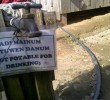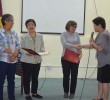NEW YORK � The Chinese government should
immediately lift the house arrest and travel restrictions imposed on Hu Jia
and Zeng Jinyan, a prominent husband-and-wife team of human rights
activists arrested on Friday, Human Rights Watch said today.
Hu and Zeng, two of China’s most well-known campaigners for the rights
of people living with HIV/AIDS, were placed under house arrest and
banned from leaving the country on May 18. During a four-hour
interrogation at a Beijing police station, police told Hu that the couple was
“suspected of harming state security.”
“The Chinese government ought to be grateful to Hu and Zeng for
educating and assisting people living with HIV/AIDS, but instead it is
punishing them,” said Brad Adams, Asia director at Human Rights Watch.
“Their work isn’t a threat to national security, but the government’s
attempt to stifle AIDS activists is a threat to public health.”
Minutes before the couple was to board a flight for a two-month trip to
Europe, Hu and Zeng were detained by eight police officers � two of
whom filmed the proceedings. The police at no point provided any official
documents showing the basis for Hu and Zeng’s house arrest and travel
ban.
Hu, a human rights activist who has monitored and reported on arrests and
harassment of high-profile individuals, spent 214 days under house arrest
between August 2006 and March 2007. The couple made a documentary
film about their house arrest, “Prisoners of Freedom City,” which records
their surveillance by state security and police over that seven-month
period.
Last week, Time magazine named Zeng as one of the world’s 100 most
influential people. Her blog
documents the routine surveillance and harassment by security forces that
China’s activists and dissidents must endure.
“I had never expected that the police would restrict me as well as Hu Jia,”
Zeng wrote on her blog. “I am already three months pregnant. What is to
be feared from me and my child?” She expressed her astonishment that the
authorities would subject both her and her husband to house arrest for
legally pursuing their rights of free expression and association.
In April, Hu released a transcript of a conversation he had with a
prominent human rights lawyer, Gao Zhisheng, in which Gao claimed that
he had been forced to “confess” under torture. Gao received a suspended
sentence in December for a charge of “subversion” in a trial that fell short
of international fair-trial standards.
The house arrest order confines Hu and Zeng to their home in Beijing and
severely limits their freedom of movement and association, as well as their
ability to contact friends and relatives.
“China’s systematic use of house arrest and state security charges against
human rights defenders seriously undermines the government’s claims that
it respects the rights of its citizens,” said Adams. “The Chinese
government should immediately end the practice of house arrest and the
use of dubious, politically motivated charges against activists.”
House arrest is just one of the many administrative measures that Chinese
authorities can deploy against dissidents and human rights activists
without having to formally charge and prosecute them under Chinese law.
The Chinese government appears to be increasing its use of house arrest
on grounds of loosely defined state security crimes as a means of quelling
public expressions of dissent in the run-up to the Beijing 2008 Olympic
Games.
Hu stated earlier this year that he was planning to “push the space for
freedoms, especially freedom of expression,” in the period leading up to
the Beijing Olympics in August 2008. But with a spate of arrests of
activists, lawyers and journalists in the past two years, China is moving in
the opposite direction. Despite its recent, more forceful response to the
AIDS epidemic, the authorities have also repeatedly harassed AIDS
activists, most recently detaining 79-year-old Dr. Gao Yaojie in
February.
“With the Olympics on the horizon, Beijing should know that its actions
are being closely watched by the rest of the world,” Adams said. “Is the
house arrest of two internationally known activists really the image that
China wants to project to the world?”
For more of Human Rights Watch’s work on China, please visit:
http://hrw.org/doc?t=asia&c=china
IMPORTANT NOTICE: INBOX is an archive of press releases, statements, announcements, letters to the editors, and manifestos sent to Davao Today for publication. Please email your materials to davaotoday@gmail.com. The opinion expessed in these items does not reflect those of Davao Today and its staff. Please refer to our terms of use/disclaimer.










